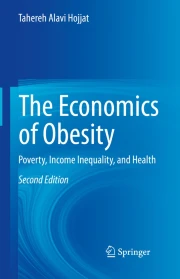
This is a preview of subscription content, log in via an institution to check access.
Softcover Book EUR 73.84
Price includes VAT (France)Hardcover Book EUR 103.38
Price includes VAT (France)Tax calculation will be finalised at checkout
Much has been written about the economic causes of obesity, but this book offers a comprehensive and deep investigation of the causes and treatment of these issues in a single volume. In the second edition, the author expands upon the serious threat that obesity poses not only to our health, but also to our society. Obesity costs billions of dollars a year in lost productivity and medical expenses.
The social distribution of obesity has changed over time. Obesity rates in the United States continue to worsen in parallel with income inequality. Socioeconomic groups with low personal capital, levels of education, and income have higher obesity rates. In fact, the rate of obesity has increased the fastest among low-income Americans. The disproportionate burden of obesity on the poor poses an economic challenge and an ethical imperative. The link between obesity, inactivity, and poverty may be too costly to ignore because obesity-associated chronic disease already accounts for 70% of US healthcare costs. Although economic and technological changes in the environment drove the obesity epidemic, the evidence for effective economic policies to prevent obesity remains limited.
Tahereh Alavi Hojjat, PhD is professor and Chair of Economics at DeSales University in Center Valley, Pennsylvania. Dr. Hojjat received her bachelor’s degree from Tehran University, Iran; master’s degree from the American University, Washington, D.C.; and PhD from Lehigh University in Bethlehem, Pennsylvania. She is past recipient of the Teaching Excellence Award by the Eastern Council of Business School and Programs (ECBSP). She received grants from the Center for Advancing Partnership in Education (CAPE) for Global Collaborative Faculty Projects and Lehigh Valley Association of Independent Colleges (LVAIC) for College Admission Mentoring Program (CAMP).
Dr. Hojjat has authored several book chapters and articles in peer-reviewed journals of business and social sciences. She has served as an advisory board member of Houghton-Mifflin Publishing and McGraw Hill companies and currently serves as an editorial advisor for severalacademic journals including Annual Editions-Global Issues, and Journal of Asian Finance, Economics and Business (JAFEB).
Dr. Hojjat authored Mini-Cases in Finance, an accompaniment to the textbook entitled Financial Markets and Institutions, Mishkin & Eakins, 7th edition (Pearson Prentice Hall, 2012). She co-authored the book entitled, Islamic Economy and Social Mobility: Cultural and Religious Considerations (IGI-Global, 2016). This book analyzes the social, cultural, religious, and political implications of the Islamic economy at the global level. Her most recent book was published by Springer in 2017: the first edition of The Economics of Obesity: Poverty, Income Inequality and Health.
Dr. Hojjat is ex-officio of the Board of Directors of the Pennsylvania Economic Association and a member of the Chapter on Energy Conservation of Lehigh Valley and the United States Association for Energy Economics (USAEE).